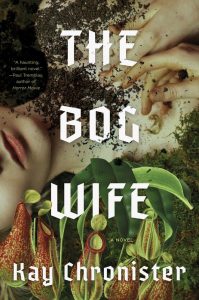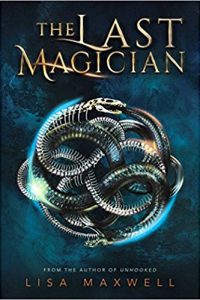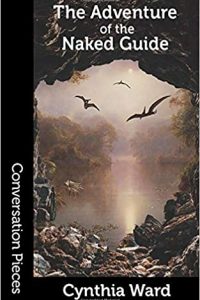The Bog Wife by Kay Chronister: Review by Jake Casella Brookins
![]()
![]()
 The Bog Wife, Kay Chronister (Counterpoint 978-1-64009-662-2, $28.00, 336pp, hc) October 2024. Cover by Nicole Caputo.
The Bog Wife, Kay Chronister (Counterpoint 978-1-64009-662-2, $28.00, 336pp, hc) October 2024. Cover by Nicole Caputo.
Isolated on their West Virginia estate, the five Haddesley siblings have a troubled and troubling relationship with their magical heritage. Charlie, the next in line to be patriarch, has been severely injured by a falling tree, and doubts his ability to fulfill his part of the bargain with the bog that supports and surrounds them. Eda just wants to keep the family going, and begins considering unorthodox ways to secure the next generation. The two youngest, Nora and Percy, are off in their own worlds – Percy to stalk the bog in increasingly unhinged solitude, Nora in a childlike fantasy of storybooks and wild animal fosters. Only the middle child, Wenna, escaped the Haddesley house, and only for a while – summoned back for their father’s death, she finds it even harder to walk away the second time.
Kay Chronister’s The Bog Wife openly questions its supernatural elements almost from the jump. The basics of the Haddesley magics are outlined shortly into the narrative: a centuries-old pact with the bog, which provides the family with natural bounty and, once a generation, a living embodiment to mother the next, the titular bog wife. But the Haddesley children, and we the readers, see little proof of this. The house is falling apart, the land is barely providing enough to keep them alive, and, until and unless the next bog wife emerges – something Charlie and Percy are particularly fixated on – they have only their own hazy memories of their vanished mother as evidence of the bog’s magic. It’s a strange move, narratively, immediately threatening to move the novel away from the speculative and towards a more mundane dissection of familial deception and abuse, but also a smartly engaging one – Chronister seems to be playing with the reader’s desire to believe the fantasy, against all evidence, even as the Haddesleys do.
The novel’s hazy, uneasy relationship with the supernatural, and its studies of involuted family psychology, recalls Shirley Jackson – though far less solid than Hill House, the Haddesley residence is similarly “not sane,” a malevolent character in its own right, and the family’s isolation and various coping strategies evoke the claustrophobic world of We Have Always Lived In The Castle. The bog wife herself, in her children’s memories at least, has more than a hint of the gothic heroine, nightgown-clad captive of the ominous mansion, and there’s a bushel of folk horror signifiers here, also, with the family’s compulsive rituals, mossy robes and, you guessed it, bog sacrifices. But this is tempered by the fact that the novel is composed of insiders only. There’s no one beyond the tiny Haddesley cult to see and be horrified, no outside investigator to purge or rescue them – at times I couldn’t help thinking of The Bog Wife as an X-Files episode in which Scully and Mulder never show up. What the novel offers, instead, is a fascinatingly internal (and thus intentionally incomplete) interrogation of tradition itself, particularly in abusively paternal forms, with a thin ray of hope stemming from the endurance of our connections to the land and each other.
The Bog Wife shares with Chronister’s much more overtly fantastic (and literally much drier) Desert Chronicles a deep interest in faith: not the certainty of a supernatural element, but what we risk, perhaps what we gain, in choosing to believe despite that uncertainty. Throughout The Bog Wife, particularly in the long stretch when Charlie is unravelling his family’s lies and it seems reasonable to doubt the Haddesley magic entirely, I found myself wondering exactly how the scales of the compact balance. The Haddesley children are asked to sacrifice so much for their “culture,” and, while it certainly doesn’t stretch the imagination that toxic family patterns can repeat so, their reasoning – what they get out of it – remains vague. Perhaps purposefully: one thing Chronister seems to be targeting is the essential emptiness of patriarchal and cultural chauvinism: We give up a lot for them, and don’t get much back.
There are some masterfully deep jabs here at overinflated or outright fake notions of heritage. As an Appalachian myself, I’m wary of making too much of the fact, as the Haddesley patriarchs do, that those mountains share an ancient connection with the Scottish Highlands. Although the novel is not topically political, I also think there’s something pretty potent in Chronister’s implosion of false claims of Appalachian authenticity at this juncture in American politics, and something pretty useful in the novel’s refutation of faux indigeneity. It’s only when the Haddesleys begin to reckon with their historical recency, the actual rather than mythic relation they have with the land, that something real and even magical can spring forth again.
“Anything that lives and does not live alone makes compacts,” the bog wife tells her children. To survive, we make compromises; we make bargains that can trap or enrich us, that bind us together. The strength of The Bog Wife is really in its character work, but there’s also something rich, unsettling, and even magical in the bog itself as a central idea: its uncanny powers of preservation and muck-buried secrets, its inevitable changes, and its vegetal interconnection and potential for rebirth.
Interested in this title? Your purchase through the links below brings us a small amount of affiliate income and helps us keep doing all the reviews you love to read!
Jake Casella Brookins is from the Pennsylvania Appalachians, and spent a fantastic amount of time in the woods. He studied biology, before switching over to philosophy & literature, at Mansfield University. He’s been a specialty coffee professional since 2006. He’s worn a lot of coffee hats. He worked in Upstate New York and Ontario for about 8 years. He’s been in Chicago since 2013; prior to the pandemic, he worked for Intelligentsia Coffee in the Loop. Starting in 2021, he’s been selling books at a local indie bookstore. He lives with his wife, Alison, and their dogs Tiptree & Jo, in Logan Square.
This review and more like it in the September 2024 issue of Locus.
 While you are here, please take a moment to support Locus with a one-time or recurring donation. We rely on reader donations to keep the magazine and site going, and would like to keep the site paywall free, but WE NEED YOUR FINANCIAL SUPPORT to continue quality coverage of the science fiction and fantasy field.
While you are here, please take a moment to support Locus with a one-time or recurring donation. We rely on reader donations to keep the magazine and site going, and would like to keep the site paywall free, but WE NEED YOUR FINANCIAL SUPPORT to continue quality coverage of the science fiction and fantasy field.
©Locus Magazine. Copyrighted material may not be republished without permission of LSFF.








